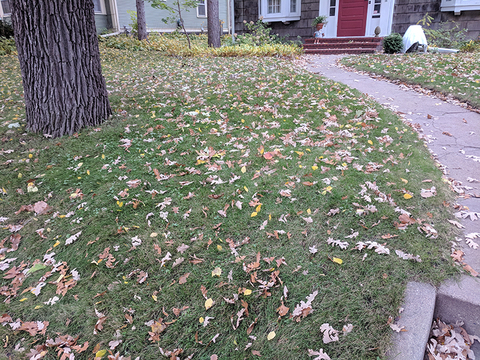Lawn mowing height
Should you mow your lawn shorter going into the winter? It depends. Some of the benefits of mowing your lawn a little shorter:
- Makes collecting tree leaf litter easier.
- Reduces the risk of snow mold diseases.
- Reduces damage from burrowing rodents like voles.
- Helps with dormant seeding.
But don't lower the mowing height too much all at once, and not any lower than 2 inches after mowing. In general, never cut more than one-third of the turf plant’s height in a single cutting (ex. moving your mowing height from 4 inches to 2.5 inches). This might stress the grass plants going into winter.
Just lower the height by one or two settings for a walk-behind mower and move it back to its normal setting for the first cutting next spring. We've summarized our lawn mowing recommendations to make preparing for winter easy.
Tree leaf litter
Tired of raking up leaves? An excellent 2013 write-up was revised for the October issue of the home lawn care newsletter.
Dormant seeding
Dormant seeding is often used to renovate or improve an area using turfgrass seed that is spread when the growing conditions are minimal. The strategy involves applying seed knowing that it will not germinate until the following spring when soil temperatures have increased.
Dormant seeding can be accomplished any time prior to the first major snow fall. After that, consider waiting until spring after snow melt but before soil temperatures get above 50 degrees F.
Lawn winterizer fertilizers
Winterizer fertilizers are marketed and sold in the late fall to help your lawn prepare for the winter. These fertilizers typically contain urea nitrogen and a potassium source (ex. a 32-0-10 fertilizer). Occasionally these products will have a “weed and feed” component as well, meaning that they have a herbicide coated on the dry fertilizer products.
Potassium is known to be essential for winter stress management in plants. There have been mixed results in the research on whether or not potassium fertilizer will help with preventing winter injury. Generally, if your lawn is not deficient in potassium, the benefit of this fertilizer will be minimal.
By the time this page is published, soil temperatures will be likely too low for these products to be useful. If you have already purchased this product, store it over-winter in a cool and dry place.
Irrigation system management
If you have an irrigation system, you should make sure that the irrigation lines have been emptied. Blow out the irrigation system to prevent leaks from pipes expanding and contracting over-winter. Use an air-pump and do it annually before the first hard freeze.
Check out the Winterizing your lawn video, part of the Watering Wisdom webinar series from Turfgrass Science.


